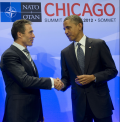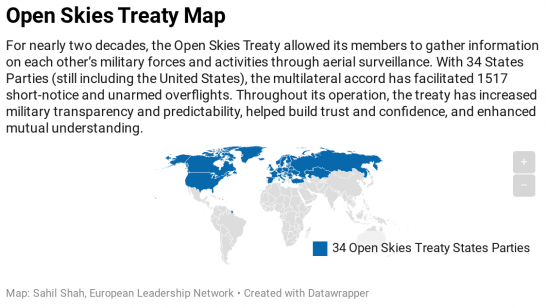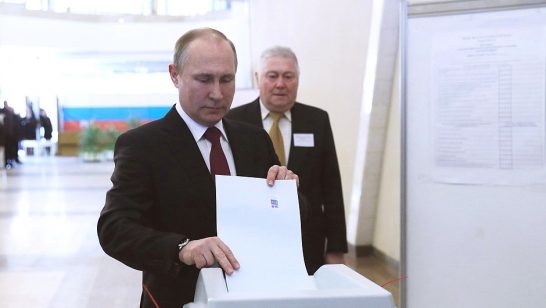European Leadership Network aims to join up the debate on nuclear and related issues across Europe, the US and Russia. To that end and in addition to our emerging series of policy briefs, we are pleased to present the ELN Forum on NATO’s Chicago Summit.
This forum features a range of personal views from former ministers, current and serving officials, as well as leading thinkers in the run-up to the 2012 NATO Chicago Summit, focusing on what a successful summit outcome would look like. It aims to cover the full diversity of views from across the NATO countries, drawing on views from France, the Baltic States, Turkey, Germany, Italy, the UK, Spain, Poland, as well as Russia.

ELN Chicago Forum papers can be accessed by clicking on the following links:
NATO, the Chicago Summit and Nuclear Weapons
Steven Pifer, the Director of the Brookings Arms Control Initiative in Washington, argues that NATO does not need to take major decisions on nuclear policy in Chicago and that there may in fact be good reasons to kick that particular can down the road. Acting unilaterally to remove US non-strategic nuclear weapons from Europe would remove a possible future bargaining chip with Russia but equally, a NATO commitment to the status quo on this issue would constrain the Alliance’s ability to negotiate the removal of these weapons at some point in the near future. This latter scenario has to be avoided, because “it is very hard to see Moscow accepting a new treaty that does not include a requirement that nuclear weapons be based on national territory”.
Imants Liegis, the former Defence Minister of Latvia, argues that retaining US interest in the Nordic-Baltic-Polish region of the alliance is vital, and that this can be achieved through demonstrating the kind of regional cooperation within Europe that makes best use of scarce resources. Cooperation with Russia is important but differences over missile defence and Syria do not augur well and progress on the nuclear issue is desirable but must be reciprocal not unilateral in nature.
Defining Success for Chicago: A Turkish Perspective
Sinan Ulgen, Chairman of the EDAM think tank in Istanbul and currently a visiting scholar at Carnegie Europe in Brussels, offers a Turkish perspective on the priorities for the Chicago Summit. He argues that the priority is not nuclear policy or further advancing NATO’s partnerships with other democracies, but the need to show progress on smart defence and on effective partnering with coalition partners, even non-democratic ones, relevant to the challenges of Turkey’s regional setting.
Building Trust in the NATO-Russia Relationship: what NATO can offer
Ambassador Linas Linkevicius, the former Defence Minister of Lithuania, argues that the main issue before the Alliance is how to build trust with Russia. This is desirable, he argues, but it must be approached with a sense of realism too. Unilateral changes to NATO nuclear policy are not the way to go. Too often in the past, the alliance has offered the hand of cooperation to Russia with little positive response, and NATO itself has not always been consistent, either in the policy positions it has communicated to Russia, or in its willingness to stand firm in support of human rights or a commitment to the rule of law.
The Chicago Summit has More Urgent Priorities than Nuclear Theology
Lord Robertson of Port Ellen, a British Labour Party politician, former NATO Secretary General and former Secretary of State for Defence, argues in favour of maintaining extended nuclear deterrence and participation amongst appropriate European Alliance members and reasons that the NATO Strategic Concept published in November 2010 reached sound policy conclusions that should be endorsed at the Chicago Summit. Attempts to “lead by example”, he says, have not borne fruit, the ongoing Deterrence and Defence Policy Review (DDPR) risks creating strains within NATO, and unless progress can be made engaging Russia such that all short range nuclear systems leave Europe, U.S. weapons should remain on the continent.
BMD Before the Chicago Nato Summit: Turning a Game-Breaker into a Game-Changer
Ambassador Ischinger, chair of the Munich Security Conference, former deputy foreign minister of Germany and former ambassador to Washington and to London, argues that ballistic missile defence (BMD) can be turned from a source of opposition and mistrust into a game-changer where NATO and Russia cooperate as true partners, if the opportunity is seized to put the goal of a joint BMD back on track. NATO leaders, he argues, should propose a high-level working group tasked to find agreement on missile defence, and with the work already done by the EASI Commission to serve as a foundation, the Euro-Atlantic security community could overcome its largest remaining obstacle.
The Context for Chicago: A Mistrustful NATO-Russia Relationship
Lord Desmond Browne of Ladyton, a British Labour Party politician, current Convenor of the Top Level Group of Parliamentarians for Nuclear Disarmament and Non-Proliferation and a member of the Executive Board for the European Leadership Network for Multilateral Nuclear Disarmament and Non-proliferation (ELN), argues that mutual relations between NATO and Russia remain characterised by deep mistrust and offers five brief points in favour of cooperative progress and a change of direction in a speech delivered at the Russian Council on International Affairs (RIAC) in Moscow on March 23rd 2012.
In Chicago, NATO should do a Sarkozy
Oliver Meier, the International Representative of the Arms Control Association and a Senior Researcher with the Institute for Peace Research and Security Policy, attacks French obduracy with regard to NATO nuclear policy and argues that NATO should press ahead with changes to declaratory policy while also committing to an ongoing process of policy review.
NATO Summit Chicago: The Need to Change
General (Ret.) Bernard Norlain, former Air Defense Commander and Air Combat Commander of the French Air Force, and the President of the Comité d’Études de la Défense Nationale and Director of the Revue Défense Nationale, argues that NATO needs to address fundamental questions about its role, including its nuclear posture, in the new circumstances now prevailing, but fears the likelihood in Chicago is that it will instead avoid the issues, largely rendering the Summit a non-event and damaging NATO in the process.
Tactical Nuclear Weapons in Europe
Janusz Adam Onyszkiewicz, former Defence Minister of Poland and Chairman of the International Centre for Democratic Transition’s (ICDT) International Board of Directors, argues for a zone free of nuclear weapons spanning European territory in Russia, central Europe (including Germany), and also importantly, countries between NATO and Russia, such as Belarus.
NATO Must Change Declaratory Policy in Chicago
Carlo Trezza, the former Special Envoy on Arms Control and Disarmament to the Italian Foreign Minister, makes a plea for a change to NATO declaratory policy at Chicago. NATO, he argues, is a global player increasingly in need UN backing and legitimization for its “out of area” operations and remains under UN and NPT scrutiny on arms control issues. Progress and coherence on negative security assurances, mainly championed by the Non Aligned Movement, would not only strengthen the NPT but also improve NATO’s multilateral standing. Trezza also makes clear that this is about more than language. Declaratory policy underpins nuclear targeting policy, which in turn leads to definitions of the numbers nuclear weapons needed. If we are to move to a world where nuclear weapons have less salience in national and international security, seeing change in the area of declaratory policy will be key.
NATO’s Deterrence and Defence Posture Review: A Status Report
NATO is undergoing a Deterrence and Defence Posture Review (DDPR) that has been characterised by divisions and disagreements among members from the outset.
Despite its potential significance, the review is proceeding with little real political engagement from national capitals and with almost no reference to the wider conditions of economic crisis and reduced defence resources. There is a significant danger that it will fail to address the new economic and political realities faced by the Alliance as a result.
Dr Ian Kearns and Simon Lunn outline the review process and current state of play, the national positions being taken up in the debate, and the issues at stake. They argue that without the injection of political interest and leadership there is a risk the opportunity for a comprehensive re-think of required NATO capabilities in new circumstances is being missed along with a vital opportunity to identify new avenues for productive dialogue with Russia. Prospects for the Chicago Summit in May are consequently uncertain at best. NATO cohesion and effectiveness, along with the overall security climate in Europe, may suffer as a result.
The opinions articulated above represent the views of the author(s), and do not necessarily reflect the position of the European Leadership Network or any of its members. The ELN’s aim is to encourage debates that will help develop Europe’s capacity to address the pressing foreign, defence, and security challenges of our time.



